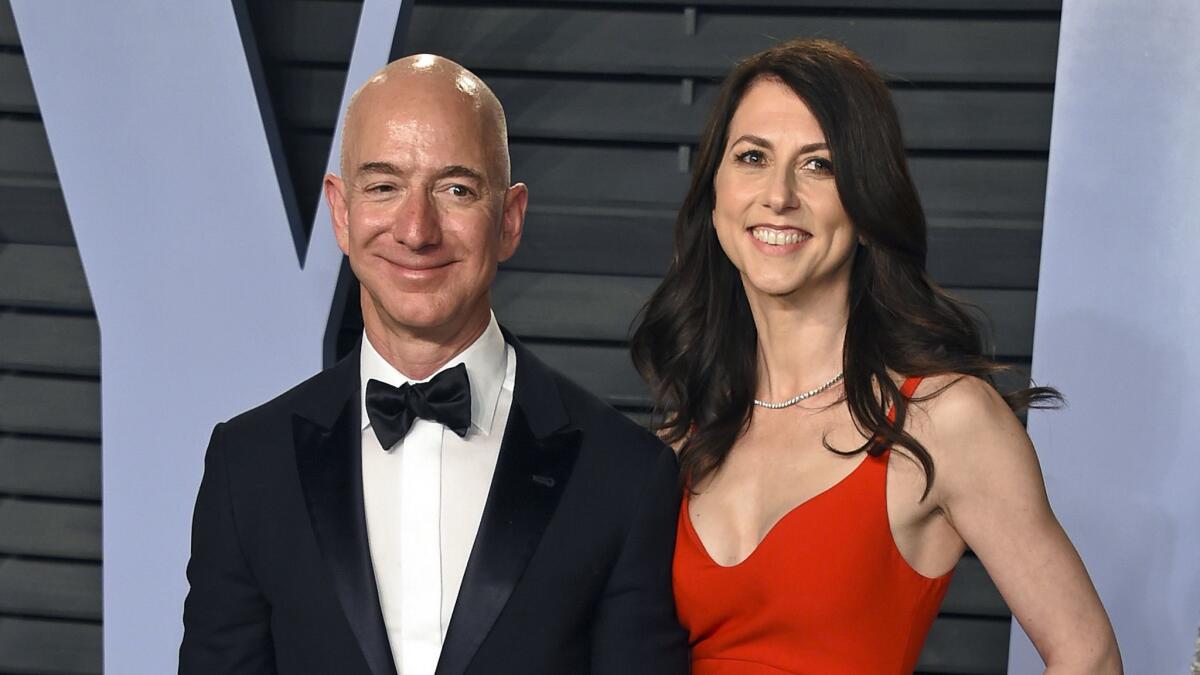The world’s richest could lose hundreds of billions under Warren’s wealth tax

- Share via
Billionaires such as Jeff Bezos, Bill Gates and Warren Buffett could have collectively lost hundreds of billions of dollars in net worth over decades if presidential candidate Elizabeth Warren’s wealth tax plan had been in effect -- and they had done nothing to avoid it.
That’s according to calculations in a new paper by two French economists who helped Warren devise the proposed tax on the wealthiest Americans.
The top 15 richest Americans would have seen their net worth decline by more than half to $433.9 billion had Warren’s plan been in place since 1982, according to the paper by UC Berkeley professors Emmanuel Saez and Gabriel Zucman.
Despite relying on some hypothetical assumptions -- the wealthy have honed tax avoidance to an art form -- the calculations highlight what could be a key question among Democratic Party presidential contenders: What should the U.S. do to address yawning income and wealth inequality?
The authors’ figures don’t take into account any steps billionaires might have taken to reduce their exposure to the tax, including saving less or giving more money away. Instead, the paper assumes that rich Americans effectively do the opposite: they reduce, rather than increase, charitable giving and consumption, in proportion to the wealth lost through the tax.
For Amazon.com Inc. founder Bezos, his estimated fortune of $160 billion in 2018, before his divorce settlement this year, would have been reduced to $86.8 billion. Microsoft Corp. founder Gates would have seen his shrink to $36.4 billion from an estimated $97 billion.
One of the most pointless exercises beloved of our policymakers is nitpicking at a novel proposal in its earliest stages, as though the details are vastly more important than the concept.
The calculations underscore how a wealth tax of just a few percentage points might erode fortunes over time and presumably reduce wealth inequality.
Besides the top five richest Americans, the paper also analyzed how Warren’s proposed tax would affect the fortunes of other wealthy individuals, including Charles Koch; Walmart Inc. heirs Jim, Rob and Alice Walton; and Michael Bloomberg, founder of Bloomberg News parent Bloomberg LP.
Billionaires of more recent vintage on the list experience smaller proportional declines in net worth because they would have been subject to the tax for shorter periods of time.
The authors’ assessment of how the wealthy would fare under Warren’s tax plan is just a small part of a wide-ranging paper laying out the rationale for such a proposal and setting out how it might work.
Massachusetts Sen. Warren has proposed that the wealthiest 75,000 households pay an annual tax of 2% on each dollar of their net worth above $50 million. It would rise to 3% on every dollar above $1 billion. She has said this would combat rising inequality.
Critics have charged that the tax would be hard to administer and easy to avoid. They’ve also questioned its constitutionality.
Zucman and Saez used Forbes magazine estimates of individuals’ 2018 wealth as a baseline for comparison in their analysis on the impact of the Warren tax. The magazine has tracked the net worth of the rich since 1982.
America’s mega-rich have a message for the field of 2020 presidential hopefuls: Take our money, please.
Some of the wealthiest Americans, including Buffett and Gates, have said people like themselves should be required to pay more in taxes.
Billionaire investor George Soros, heiress Abigail Disney and 17 other wealthy individuals published an open letter in June in support of Warren’s wealth tax and said lawmakers have a moral responsibility to levy higher taxes on the rich.
Both Saez and Zucman have conducted research with Thomas Piketty, whose best-selling book “Capital in the 21st Century” put a spotlight on income and wealth disparities. Piketty is out with a French edition of his new book “Capital and Ideology,” which proposes government fixes.
More to Read
Inside the business of entertainment
The Wide Shot brings you news, analysis and insights on everything from streaming wars to production — and what it all means for the future.
You may occasionally receive promotional content from the Los Angeles Times.











